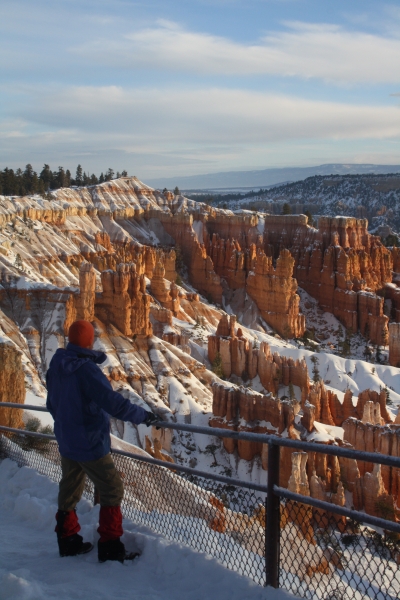Hypothermia a threat, even here
While we in Southern Nevada don't see the extreme cold temperatures found in some other states, hypothermia can be a big threat, even here, for those who spend time outdoors. One chilling fact, of which many people remain unaware, is that they can become a victim without being exposed to freezing temperatures. So early winter, when we rationalize that it's not so very cold yet, and go out unprepared, is one of the more dangerous times.
Hypothermia can start with your body just a few degrees below its normal core temperature of 98.6 degrees (this varies from person to person). Prolonged exposure to wind or rain can lead to problems at air temperatures as warm as the 50s, so it's imperative to dress appropriately and watch out for the symptoms.
Being prepared is the best way to prevent hypothermia. Start off any outing well nourished and hydrated, and be sure to dress properly from head to toe. In cold weather a layering system works best, particularly over the body core area – your torso.
The layer next to your skin should be a synthetic wicking fabric (not cotton). Synthetics will keep you dryer because they won't absorb moisture from perspiration, but rather lift it out and evaporate away. Your second layer might be a synthetic fleece jacket or vest and will serve as an insulating layer to keep in your body's heat. In severely cold temperatures you could use a down-filled layer here, as long as you know it won't get wet. The insulating value of down is greatly compromised when wet. The final layer should be a waterproof shell, which will not only keep out the rain and snow, but also serve as a windbreaker.
Don't forget good winter socks (again not cotton) and proper footwear, and finish it off with a warm hat and gloves or mittens. If you will be skiing, snowshoeing or hiking in wet conditions, use the same layering system for your legs as your core. There are many excellent outdoor sporting goods stores in our area. They sell everything you'll need to be properly outfitted for winter excursions.
Knowing the symptoms of hypothermia means you'll have the chance to prevent a mild case from turning into a life-threatening one.
The first signs are often shivering, some numbness and lack of coordination. When these occur together, it is vital you get the person into a sheltered area or near a heat source. Warm, sweet (non-alcoholic) fluids can be given. Remove any wet clothing immediately and replace with dry clothing or warm blankets and try to get the person moving around to help them warm up.
Symptoms such as being non-responsive, or appearing drunk or confused, could signal a life-threatening case of hypothermia, and require immediate professional medical attention. Drops in body temperature can cause heart and respiratory failure, which can be fatal.
Taking an unexpected spill into cold water is a sure way to immediate trouble. You will lose body heat 25 percent faster in the water than in cold air, so staying there even a few minutes longer than necessary will lower your chance of survival. Get out of the water immediately and get dry fast. If you can't get completely dry, squeeze as much water from your clothes as you can. If you can build a warming fire, do it immediately; you may start shivering too badly to do it later. Those 99-cent butane cigarette lighters from the convenience store will light even after full immersion in water, but to be sure, test the one you are going to keep in your pocket all winter. It will produce many more lights than will the matches in a waterproof matchbox.
You don't have to be engaged in outdoor sport to encounter trouble in cold weather. If your vehicle breaks down, for instance, you will need to be prepared. Presuming you already keep basic emergency supplies in your vehicle, such as a flashlight, water, food, shovel etc., it's a good idea to expand the kit when traveling outside urban areas.
Once you begin thinking about this, you will no doubt want to add some other personal items, but some worthwhile starters are a blanket or sleeping bag, warm hat, gloves and extra dry clothes for each person. These few items, in your car instead of your closet, could turn a potentially deadly situation into a mere inconvenience.
Deborah Wall is the author of "Base Camp Las Vegas, Hiking the Southwestern States," "Great Hikes, A Cerca Country Guide," and co-author of "Access For All, Touring the Southwest with Limited Mobility." Wall can be reached at Deborabus@aol.com.
















